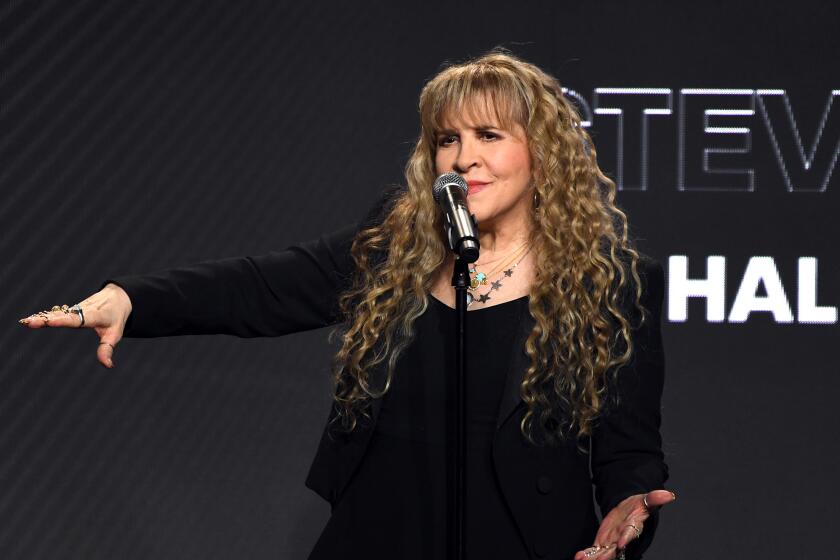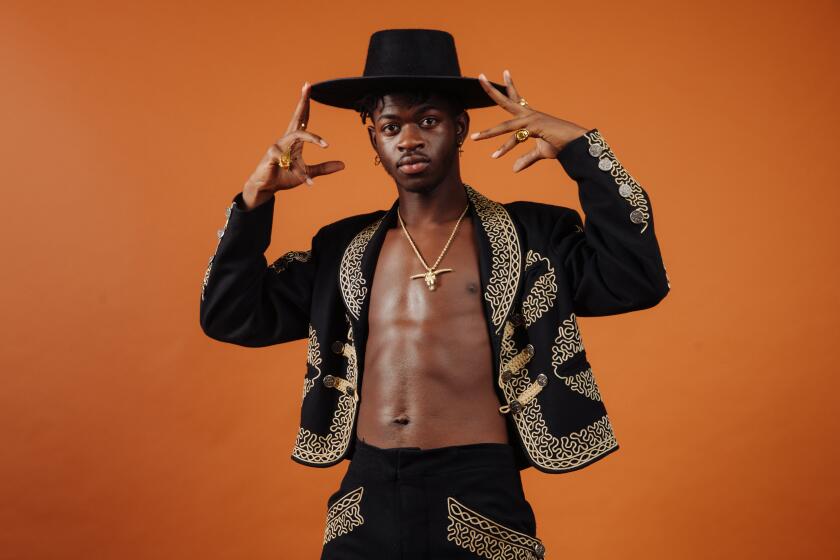For Her, the Fight Is Far From Over
- Share via
Ely Guerra is too short for the stool she’s supposed to sit on during her performance for “LATV Live,” the Latin music cable program on KJLA. The diminutive Mexican singer-songwriter perches on the edge of the seat, holding her big pink acoustic guitar.
Her position looks awkward, legs spread under her long black dress, one red sandal dangling, the other stretching to reach the floor. Stagehands bring another chair, but this one has armrests she considers too confining.
“I move constantly,” warns Guerra, in Los Angeles for a series of appearances that includes a show Sunday night with her four-piece band at the Key Club. “I try my best not to bang myself up.”
So it’s back to the stool, which the singer moves to the precarious edge of a platform. When cameras roll for the live show, Guerra starts singing softly at first, just a breathy whisper and fragile falsetto that quiet her rambunctious in-studio fans.
Then the singer seems to fall into a trance, her head held back, eyes closed, throat wide open. Out pours a husky and deeply wounded voice. The plaintive lyrics of “No Quiero Hablar” (I Don’t Want to Talk) turn to soulful moans and gypsy wails.
Her torso and guitar twist together, her left leg flailing almost convulsively. The foot that could barely brace her is now stamping so hard it thunders through the sound stage as she screams, “No, no, no, no quiero hablar.”
Offstage, members of her staff are at the edge of their seats, worried that her volcanic emotions might propel her backward off the platform.
Welcome to the suspense of Ely Guerra live, more primal experience than simple performance.
Guerra, 30, is hailed as a heroine of Mexico’s rich alternative music scene. A self-taught guitarist, she’s an intense and brooding composer with a defiantly distinctive sound, blending muted samba rhythms with trip-hop beats and ethereal electronica. She’s been playing professionally half her life, struggling all the way to stay true to her admittedly dark artistic vision.
In Mexico’s male-chauvinist music industry, she says, her beauty has been her bane. A pretty woman is expected to sing pretty pop songs.
“My career is not about money,” Guerra says during an interview in eloquent Spanish peppered with saucy slang. “Maybe what I have to offer through my music is an awakening of new things in other people. Because I see that for me, day by day, music educates me, transforms me and makes me strong.”
Over and over in her career, Guerra has had to plumb that inner strength, which she explores in songs of solitude and longing.
More than once, she has stormed out of radio stations during interviews, infuriated by the sexist tack taken by male radio personalities. While on the air in Tijuana, she scolded one disrespectful DJ who kept making sexual insinuations, calling him “a menace to the nation” for promoting a backward “Third World mentality.”
After the confrontation, Guerra shaved off her long hair and for two years looked like a Mexican Sinead O’Connor.
“I was sick and tired of being considered a beautiful idiot,” she says, using a Mexican profanity. “Maybe this way they’ll want to talk about something else.”
Guerra, her naturally brown hair briefly blond and now dyed black, has recorded three albums on two labels over 10 years. The first two are out of print, cherished like relics by her cult following. Her latest work, 1999’s critically acclaimed “Lotofire,” was finally released last month in the United States by Higher Octave. It’s the only one to make it across the border so far.
But Guerra’s deeply introspective work, recorded in New York with top studio musicians, almost didn’t see the light of day. At first, her label in Mexico refused to release it, she says. Executives simply didn’t know what do with such a stubbornly noncommercial work. For Guerra, the album was too personal to abandon. “Lotofire” was her life by slices: “Yo No” (Not Me), her demand for respect as a woman; “Tengo Frio,” her admission of fear and hurt twisted into need; “Yo Prometo” (I Promise), her tender vow of love to a soft bossa beat.
From her first album in 1992, Guerra posed a puzzle for macho marketing logic, which held that an attractive woman who could play guitar and write her own songs was too hard a sell.
“It’s obnoxious to hear them say, ‘Guerra, you’re talented, but since you’re pretty I don’t know how to sell you,’” says the singer, who has a pure complexion, high cheekbones and finely chiseled jaw.
“But I can’t really blame them so much. The whole process of music created by women in Mexico is something new. It’s barely starting to grow, and I think I was caught at the beginning of all that. The labels were not the only ones who were misguided. I was a little lost myself at first.”
Elizabeth Guerra was born in Monterrey and raised in Guadalajara, the middle of three daughters in a well-to-do family. Her father was a professional soccer player and coach; her mother a model and homemaker. She recalls a wholesome, happy upbringing, filled with ballet classes and swimming meets.
But very little music. The stereo was rarely played at home, and she never took music lessons. She wasn’t even much of a fan. Even today, she feels intimidated in music stores, she says, mimicking fingers anxiously flicking through record racks. And she gets nervous when people insist on sharing their newest musical finds, mocking a breathless “have you heard this one yet?” excitement.
“I stress out because I’m so abnormal,” says Guerra, who recently ended a five-year relationship with an incurable music fanatic, Tito of the Mexican rock group Molotov. “I’m 90% Catholic and fully flagellant, with all the blame. So I feel guilty that I’m not voracious about music. That’s not normal for a musician.”
She’s casual about identifying musical influences. Brazilian music her parents played while she was growing up. Depeche Mode albums shared by a friend. The old standards of Agustin Lara and modern stuff by Edie Brickell.
And lyrically, the poetic songwriting of Joni Mitchell and Silvio Rodriguez. “I started writing songs to express myself, because I was a girl who couldn’t talk back to my parents when they committed some injustice, so to speak,” says Guerra, who is much more powerful in person than on her oddly restrained new record.
“When I would try to say something, I’d get a lump in my throat and I’d feel like crying.”
The first song she wrote for her mother was titled “Perdoname” (Forgive Me).
During her appearance on “LATV Live,” host Giovanny Blanco asks if she has any advice for her young fans, who chant “Ely, Ely, Ely” after each song.
No advice really, the singer says sweetly. All she has to offer is the lesson of her experience: “Quien sabe luchar, sabe ganar.”
Whoever knows how to struggle knows how to win.
More to Read
The biggest entertainment stories
Get our big stories about Hollywood, film, television, music, arts, culture and more right in your inbox as soon as they publish.
You may occasionally receive promotional content from the Los Angeles Times.










